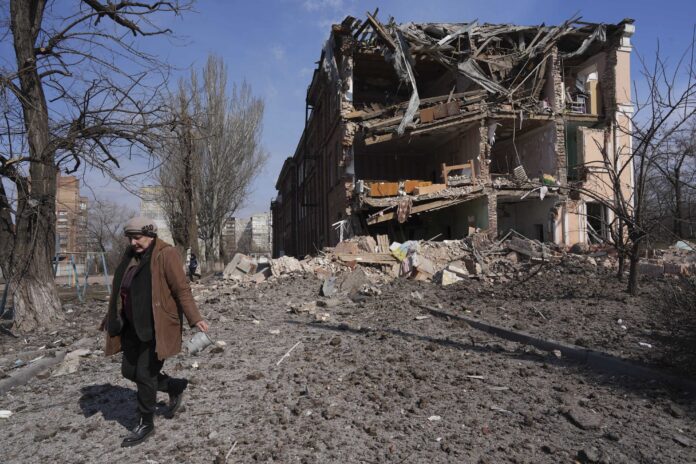Viktoria has just buried her stepfather Leonid after the car ferrying him to a hospital was blown up during fierce fighting in Mariupol, the port city in southeast Ukraine that has become the main focal point of the month-long war.
Holding back tears, the 46-year-old factory worker described how Leonid, 73, had got injured and was being escorted to the hospital for treatment with a doctor when they and an unknown third man in the car were blown up.
“This guy had taken a seat instead of me and then they all got blown up in that car,” she said, pointing to the vehicle nearby, now just a mangled mass of twisted metal.
“It could have been me,” she sobbed, after planting a small wooden cross on the makeshift grave. It was one of many dug out of a grassy verge near charred apartment blocks.
The incident happened on March 12, but Viktoria’s son and his friend were only now able to bury Leonid as temperatures slowly rise and the earth thaws.
“It has got warmer and we could bury him… Of course, later we plan to rebury him. That’s all we can do for now,” she said.
Trending Stories
Zelenskyy says ‘confrontational’ talks between Ukraine and Russia moving forward
Notorious Canadian sniper rumoured to have died in Ukraine is alive and well
It is a grimly familiar story in Mariupol, once a city of 400,000 people that has been almost completely flattened by prolonged Russian bombardment aimed at breaking the resistance of the city’s Ukrainian defenders.
Hundreds of thousands of people have been hiding in basements with no running water, food, medicine or power, unable or unwilling to leave. Ukraine’s President Volodymyr Zelenskiy said on Tuesday there was “nothing left” of the city now.
Ukraine rejects Russia’s demand to surrender decimated Mariupol
In a part of the city controlled by Russian forces, more than 100 people waited patiently in line on Wednesday for boxes of food and humanitarian supplies being distributed from a truck.
Angelina, a young mother of two, said she had received bread, diapers and baby food, adding that she was glad to have arrived on time for this delivery.
“You don’t always find out in time and then you arrive too late,” she said.
Ukrainians and Russians have blamed each other for repeated failures to establish secure humanitarian corridors for civilians to flee the city.
“It’s difficult to leave by bus now. We hope the number of people trying to get out will go down and it will get easier for us to leave,” said Angelina.
The war has killed thousands of people and driven some 10 million – about a quarter of Ukraine’s population – from their homes. Of them, some 3.5 million – mostly women and children – have fled the country.
Mariupol lies in a strategically important position on the Sea of Azov. Its capture would allow Russian forces to link up areas in the east held by pro-Russian separatists with the Crimean Peninsula, annexed by Moscow from Ukraine in 2014.
(Writing by Gareth Jones, Editing by Rosalba O’Brien)
© 2022 Reuters



